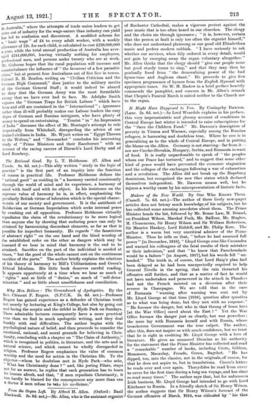of Rochester Cathedral, makes a vigorous protest against the poor
musio that is too often heard in our churches. The clergy and the choirs sin through ignorance ; " it is, however, certain that the person at fault is only too often the organist himself," who does not understand plainsong or our good old Elizabethan music and prefers modern rubbish. " I have seriously to ask whether our services, when fitly ordered in every detail, would not gain by sweeping away the organ voluntary altogether." Mr. Allen thinks that the clergy should " give our people none but good sturdy tunes to sing," and that they may then be gradually freed from " the demoralizing power of the bad hymn-tune and Anglican chant." He proceeds to give five specimen programmes of hymns from the English Hymnal with appropriate tunes. Sir W. H. Hadow in a brief preface heartily commends the pamphlet, and concurs in Mr. Allen's remark that Chopin's Funeral March is suited neither to the Church nee to the organ.


































 Previous page
Previous page